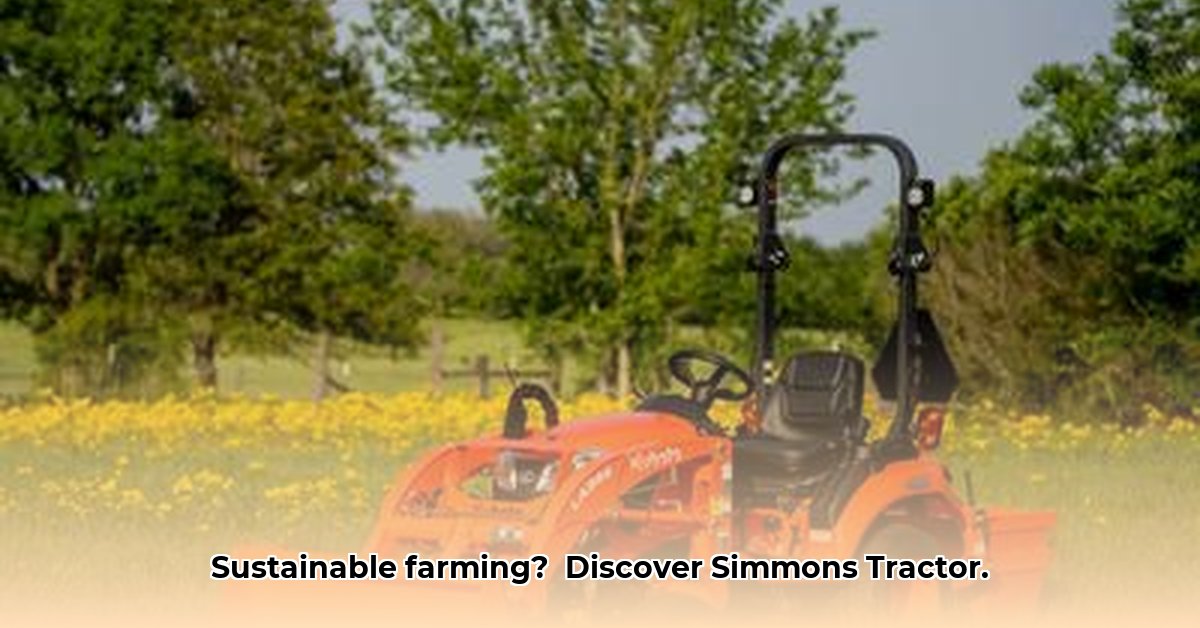
Embracing Sustainable Practices in Southwest Louisiana Agriculture
Southwest Louisiana farmers face the challenge of maximizing yields while preserving precious natural resources. This presents a significant opportunity for Simmons Tractor in Deridder, a trusted local entity, to become a leader in promoting sustainable agricultural practices within the region. By strategically integrating sustainable solutions, Simmons Tractor can enhance the profitability and environmental responsibility of local farms. How can this be achieved effectively? Let's explore a practical roadmap. For additional resources on agricultural equipment, check out this helpful site.
A Strategic Plan for Sustainable Growth at Simmons Tractor
Simmons Tractor's success in transitioning to a sustainable focus hinges on several key strategic actions. This isn't simply about adding new products to the catalog; it requires a comprehensive approach encompassing equipment selection, staff training, marketing, and collaborative partnerships.
Step 1: Comprehensive Equipment Assessment: A thorough audit of Simmons Tractor's current equipment portfolio is essential. This involves identifying gaps in sustainable solutions and prioritizing the acquisition of technologies such as precision farming tools, minimally disruptive tillage equipment, and smart irrigation systems. This strategic inventory will guide future investments.
Step 2: Empowering the Team Through Training: Investing in comprehensive training for sales and service staff is paramount. They need to understand the benefits of sustainable agriculture and effectively communicate these advantages to farmers. This knowledge transfer builds confidence and enables them to act as informed consultants, not just salespeople.
Step 3: Targeted Marketing and Outreach: Simmons Tractor needs a robust marketing strategy emphasizing the financial and environmental benefits of sustainable equipment. This could include workshops, on-farm demonstrations showcasing equipment in action, and the creation of informative online resources and educational materials. Demonstrating tangible ROI is critical.
Step 4: Strategic Partnerships for Growth: Collaborating with companies specializing in sustainable technologies expands Simmons Tractor's expertise and credibility. Partnerships provide access to cutting-edge solutions and broaden their market reach, enhancing their position as a sustainable agriculture leader.
Step 5: Building Long-Term Customer Relationships: A commitment to long-term service and support is crucial. Developing specialized maintenance programs for sustainable equipment builds trust and demonstrates a sustained commitment to the farmer's success, moving beyond a simple sales transaction to a strategic partnership. This fosters loyalty and positions Simmons Tractor as a reliable long-term partner.
Sustainable Farming Equipment: Optimizing Efficiency and Environmental Impact
The transition to sustainable agriculture involves adopting technologies that optimize resource utilization and minimize environmental impact. Key areas include:
Precision Farming Technology: GPS-guided equipment (like auto-steer tractors) minimizes input waste, reducing costs while enhancing environmental stewardship. Isn't maximizing efficiency and minimizing resource consumption a win-win for farmers and the planet? Data reveals that precision farming can increase yields by up to 20%.
Minimally Disruptive Tillage Equipment: Reduced soil disturbance improves soil health, minimizing erosion and maximizing water retention. Studies show that no-till farming can enhance carbon sequestration in the soil.
Smart Irrigation Systems: Efficient irrigation systems, like drip irrigation, conserve water – a critical resource, especially in Louisiana. Smart irrigation can reduce water usage by up to 40%, saving farmers money and protecting the environment.
The Economic Benefits of Sustainable Farming Practices
Sustainable farming isn't merely environmentally responsible; it's economically advantageous. Lower input costs (fertilizers, pesticides) and improved yields translate to increased profitability. This is a point often overlooked – sustainable farming offers a robust return on investment, attracting more environmentally conscious farmers.
Addressing Potential Challenges: A Proactive Approach
Several challenges may hinder the adoption of sustainable practices. Here's how Simmons Tractor can mitigate them:
| Risk Factor | Mitigation Strategy |
|---|---|
| Farmer hesitancy to adopt new tech | Offer comprehensive training, financing options, and showcase successful case studies. |
| Lack of expert technicians | Invest in specialized training programs and partner with equipment manufacturers. |
| High upfront equipment costs | Explore financing options, government subsidies, and leasing agreements. |
| Supply chain disruptions | Diversify suppliers and foster strong relationships with key vendors. |
Financing Sustainable Agriculture: Empowering Small Farms
Securing financing for sustainable equipment presents a significant barrier for small farms. To address this, Simmons Tractor should facilitate connections with resources like the Farm Service Agency (FSA) and private lenders, assisting farmers in navigating loan applications and securing favorable terms. This creates win-win situations for farmers and Simmons Tractor.
Key Takeaways:
- Simmons Tractor can play a vital role in fostering the adoption of sustainable agricultural practices in Southwest Louisiana.
- A multifaceted approach – encompassing equipment, training, marketing, and partnerships – is crucial for success.
- Sustainable agriculture offers both environmental and economic benefits, making it a compelling proposition for farmers.
"By combining their established reputation with a commitment to sustainable solutions, Simmons Tractor is well-positioned to lead the way towards a more prosperous and environmentally responsible agricultural future in Southwest Louisiana," says Dr. Amelia Hernandez, Agricultural Economics Professor at Louisiana State University.